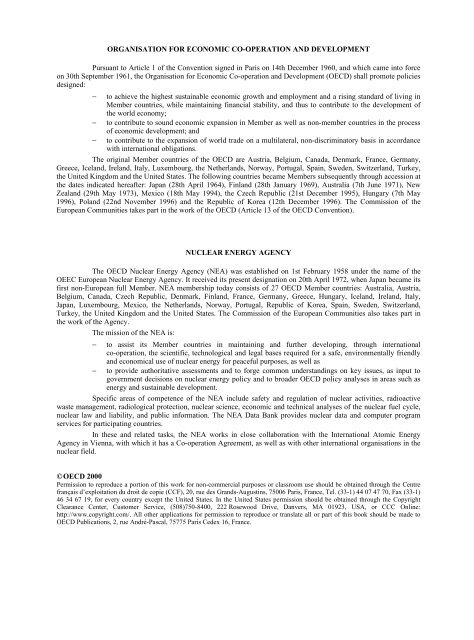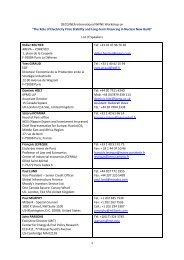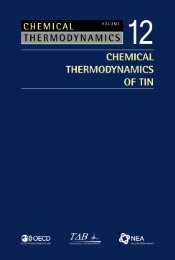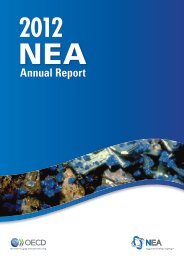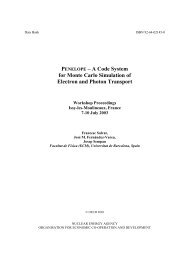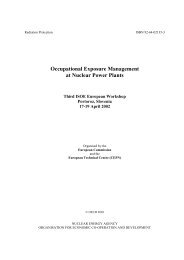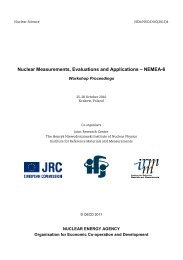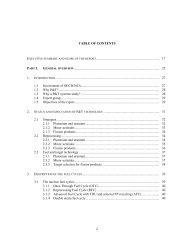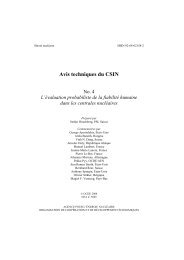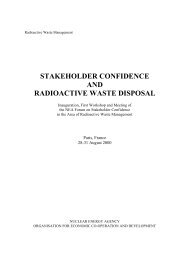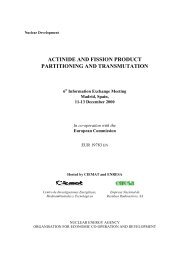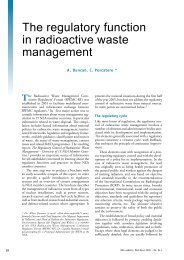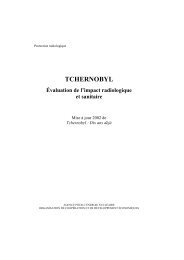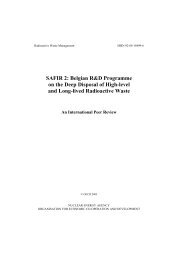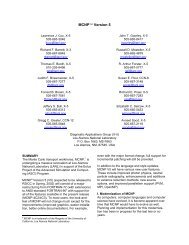Pyrochemical Separations - OECD Nuclear Energy Agency
Pyrochemical Separations - OECD Nuclear Energy Agency
Pyrochemical Separations - OECD Nuclear Energy Agency
You also want an ePaper? Increase the reach of your titles
YUMPU automatically turns print PDFs into web optimized ePapers that Google loves.
ORGANISATION FOR ECONOMIC CO-OPERATION AND DEVELOPMENT<br />
Pursuant to Article 1 of the Convention signed in Paris on 14th December 1960, and which came into force<br />
on 30th September 1961, the Organisation for Economic Co-operation and Development (<strong>OECD</strong>) shall promote policies<br />
designed:<br />
− to achieve the highest sustainable economic growth and employment and a rising standard of living in<br />
Member countries, while maintaining financial stability, and thus to contribute to the development of<br />
the world economy;<br />
− to contribute to sound economic expansion in Member as well as non-member countries in the process<br />
of economic development; and<br />
− to contribute to the expansion of world trade on a multilateral, non-discriminatory basis in accordance<br />
with international obligations.<br />
The original Member countries of the <strong>OECD</strong> are Austria, Belgium, Canada, Denmark, France, Germany,<br />
Greece, Iceland, Ireland, Italy, Luxembourg, the Netherlands, Norway, Portugal, Spain, Sweden, Switzerland, Turkey,<br />
the United Kingdom and the United States. The following countries became Members subsequently through accession at<br />
the dates indicated hereafter: Japan (28th April 1964), Finland (28th January 1969), Australia (7th June 1971), New<br />
Zealand (29th May 1973), Mexico (18th May 1994), the Czech Republic (21st December 1995), Hungary (7th May<br />
1996), Poland (22nd November 1996) and the Republic of Korea (12th December 1996). The Commission of the<br />
European Communities takes part in the work of the <strong>OECD</strong> (Article 13 of the <strong>OECD</strong> Convention).<br />
NUCLEAR ENERGY AGENCY<br />
The <strong>OECD</strong> <strong>Nuclear</strong> <strong>Energy</strong> <strong>Agency</strong> (NEA) was established on 1st February 1958 under the name of the<br />
OEEC European <strong>Nuclear</strong> <strong>Energy</strong> <strong>Agency</strong>. It received its present designation on 20th April 1972, when Japan became its<br />
first non-European full Member. NEA membership today consists of 27 <strong>OECD</strong> Member countries: Australia, Austria,<br />
Belgium, Canada, Czech Republic, Denmark, Finland, France, Germany, Greece, Hungary, Iceland, Ireland, Italy,<br />
Japan, Luxembourg, Mexico, the Netherlands, Norway, Portugal, Republic of Korea, Spain, Sweden, Switzerland,<br />
Turkey, the United Kingdom and the United States. The Commission of the European Communities also takes part in<br />
the work of the <strong>Agency</strong>.<br />
The mission of the NEA is:<br />
− to assist its Member countries in maintaining and further developing, through international<br />
co-operation, the scientific, technological and legal bases required for a safe, environmentally friendly<br />
and economical use of nuclear energy for peaceful purposes, as well as<br />
− to provide authoritative assessments and to forge common understandings on key issues, as input to<br />
government decisions on nuclear energy policy and to broader <strong>OECD</strong> policy analyses in areas such as<br />
energy and sustainable development.<br />
Specific areas of competence of the NEA include safety and regulation of nuclear activities, radioactive<br />
waste management, radiological protection, nuclear science, economic and technical analyses of the nuclear fuel cycle,<br />
nuclear law and liability, and public information. The NEA Data Bank provides nuclear data and computer program<br />
services for participating countries.<br />
In these and related tasks, the NEA works in close collaboration with the International Atomic <strong>Energy</strong><br />
<strong>Agency</strong> in Vienna, with which it has a Co-operation Agreement, as well as with other international organisations in the<br />
nuclear field.<br />
©<strong>OECD</strong> 2000<br />
Permission to reproduce a portion of this work for non-commercial purposes or classroom use should be obtained through the Centre<br />
français d’exploitation du droit de copie (CCF), 20, rue des Grands-Augustins, 75006 Paris, France, Tel. (33-1) 44 07 47 70, Fax (33-1)<br />
46 34 67 19, for every country except the United States. In the United States permission should be obtained through the Copyright<br />
Clearance Center, Customer Service, (508)750-8400, 222 Rosewood Drive, Danvers, MA 01923, USA, or CCC Online:<br />
http://www.copyright.com/. All other applications for permission to reproduce or translate all or part of this book should be made to<br />
<strong>OECD</strong> Publications, 2, rue André-Pascal, 75775 Paris Cedex 16, France.


